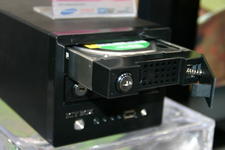CeBIT 2010: RaidSonic Shows Icy Boxes
The NAS 5220 and its brothers NAS 6210 and 6220 provide Linux-based network-attached storage into the home for under $275.
The difference between the 52xx and 62xx models is that users of the latter models can rely on an online service for access anywhere in memory, such as for transferring vacation photos to their homes. In the NAS 6210 and 6220, that are different only in their number of hard drives, and the removable drive modules are also lockable. Both have one USB port in the front and two in the back, along with an Ethernet port.
The NAS 5220, at about $217, is going through its final quality checks before being shipped, although the RaidSonic spokesperson revealed no fixed release date to Linux Magazine Online. The model, according to RaidSonic, is mainly for savvy users, while the 62xx twins are more "plug-and-play." The 5220 access is only via FTP in a bit more complicated way. The hard drives are not removable, but are easily accessible from underneath.
The NAS 6210, which without a hard drive should cost around US$230, also provides what should be an already workable eSATA port. The 6220, which should appear end of April at an undisclosed price, works over hardware RAID for its two 3.5" drive modules. A change from its previous model is the Marvell chipset. In contrast, some compromises were made to the board design and operating system for the 5220.
All devices run Linux (an extended Reddoxx in some version). Inquiry into source code availability proved unsuccessful.
Subscribe to our Linux Newsletters
Find Linux and Open Source Jobs
Subscribe to our ADMIN Newsletters
Support Our Work
Linux Magazine content is made possible with support from readers like you. Please consider contributing when you’ve found an article to be beneficial.

News
-
New Steam Client Ups the Ante for Linux
The latest release from Steam has some pretty cool tricks up its sleeve.
-
Gnome OS Transitioning Toward a General-Purpose Distro
If you're looking for the perfectly vanilla take on the Gnome desktop, Gnome OS might be for you.
-
Fedora 41 Released with New Features
If you're a Fedora fan or just looking for a Linux distribution to help you migrate from Windows, Fedora 41 might be just the ticket.
-
AlmaLinux OS Kitten 10 Gives Power Users a Sneak Preview
If you're looking to kick the tires of AlmaLinux's upstream version, the developers have a purrfect solution.
-
Gnome 47.1 Released with a Few Fixes
The latest release of the Gnome desktop is all about fixing a few nagging issues and not about bringing new features into the mix.
-
System76 Unveils an Ampere-Powered Thelio Desktop
If you're looking for a new desktop system for developing autonomous driving and software-defined vehicle solutions. System76 has you covered.
-
VirtualBox 7.1.4 Includes Initial Support for Linux kernel 6.12
The latest version of VirtualBox has arrived and it not only adds initial support for kernel 6.12 but another feature that will make using the virtual machine tool much easier.
-
New Slimbook EVO with Raw AMD Ryzen Power
If you're looking for serious power in a 14" ultrabook that is powered by Linux, Slimbook has just the thing for you.
-
The Gnome Foundation Struggling to Stay Afloat
The foundation behind the Gnome desktop environment is having to go through some serious belt-tightening due to continued financial problems.
-
Thousands of Linux Servers Infected with Stealth Malware Since 2021
Perfctl is capable of remaining undetected, which makes it dangerous and hard to mitigate.

